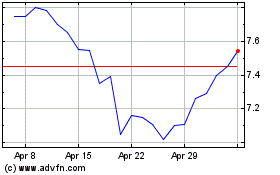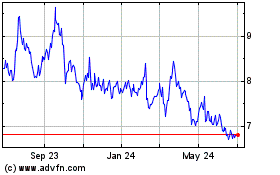By Nick Kostov
This article is being republished as part of our daily
reproduction of WSJ.com articles that also appeared in the U.S.
print edition of The Wall Street Journal (January 25, 2019).
PARIS -- The resignation of Carlos Ghosn as chief executive and
chairman of Renault SA brings down the curtain on a decadeslong
career that made him a symbol of globalization's endless march as
well as its pitfalls.
On Thursday, Renault's board tapped Michelin chief
Jean-Dominique Senard to become chairman of the French auto maker
and appointed Thierry Bolloré, Renault's deputy chief executive
officer, to take over as CEO. The moves came after France's finance
minister said Mr. Ghosn had relinquished his leadership from the
confines of his Tokyo jail cell.
Mr. Ghosn, who until late November was also chairman of Nissan
Motor Corp., has been charged by Japanese prosecutors with
understating his compensation on eight years of Nissan financial
reports and causing the Japanese auto maker to pay the company of a
Saudi friend who helped him with a personal financial problem. He
denies any wrongdoing.
During his tenure at atop Renault and alliance partner Nissan,
Mr. Ghosn broke through cultural and operational barriers in a feat
many in the industry considered impossible at the time. In cracking
that code, he became a model for auto executives and the embodiment
of globalism itself, jetting between continents as he set higher
and higher targets.
His own roots reach wide. Born in Brazil, he was sent as a child
to live with family in Lebanon. He later attended two elite
engineering schools in Paris, before joining French tire maker
Michelin. He holds French, Brazilian and Lebanese citizenship.
Mr. Ghosn, who is 64 years old, is widely credited with saving
Nissan after it teamed up with Renault in 1999. But in corporate
France, where Mr. Ghosn cut his teeth, he has been seen in a less
flattering light. From the halls of government to the factory towns
that dot the French countryside, Mr. Ghosn's rise was viewed by
many as evidence of globalism's excesses.
He collected paychecks in line with peers at multinational
companies but hefty by French standards. He was laser-focused on
wringing costs out of Renault's alliance with Nissan and Mitsubishi
Motors Corp. And his constant travels meant he spent less time
getting to know workers on the factory floor in France.
"It is an impossible job to manage such a vast empire," said
Louis Schweitzer, a longtime CEO at Renault who hired Mr. Ghosn in
1996.
Mr. Ghosn, who was arrested in November, said his pay as
auto-making chief was justified by his performance. His defenders
said his outsize personality and round-the-clock work ethic was the
glue that kept the alliance between Renault and Nissan and
Mitsubishi together.
Mr. Ghosn, in an interview with The Wall Street Journal in 2017,
cautioned against focusing on globalization's excesses. "If you
spend your time not talking about the benefits of globalization,"
he said, "you end up in a situation where people don't understand
why they need to continue to feed into this trend."
Renault is a vastly different company compared with the one he
joined 23 years ago. More international and profitable, it is the
linchpin of a globe-spanning alliance that pumped out more than 10
million vehicles in 2017 -- and Renault doesn't even sell in the
U.S. Renault holds 43% of Nissan, wielding the power to appoint
some of the Japanese auto maker's board members, while Nissan holds
15% of Renault with no voting rights.
The exit of Mr. Ghosn has uncovered and in some ways exacerbated
tensions within the alliance. Among Nissan staff, there have been
calls for a change in the balance of power between the partners and
signs of resentment of Mr. Ghosn's clout and compensation as a
foreigner.
Mr. Ghosn joined Renault in 1996, when the French car maker was
poised to report its biggest loss ever. It was his cost cutting as
the No. 2 executive at Renault that helped it return to profit and
accumulate the cash that it used to make a $5 billion investment in
Nissan in 1999.
Mr. Schweitzer dispatched Mr. Ghosn to Japan, where his work
turning around Nissan is industry legend and earned him the Légion
d'Honneur, one of France's highest honors, in 2002. He quickly
became known for his results-oriented management style,
particularly his willingness to reveal profit and sales targets to
the markets -- then to deliver on them.
Mr. Ghosn was riding high by the time he returned to Renault in
2005 as chief executive. Renault needed restructuring, but wasn't
under the same financial duress as Nissan had once been. That made
the company more resistant to change, while both the government and
unions opposed job cuts.
He got to work slashing costs, launching many new models and
increasing the proportion of sales outside Europe significantly,
all without cutting jobs.
Mr. Ghosn tried to add General Motors Co. to the Renault-Nissan
alliance, but the talks with the U.S. auto maker failed.
Eventually, he brought Mitsubishi in as a partner.
When the 2008 financial crisis hit, he delayed construction of
factories in India and scrapped plans to make bigger cars with
fatter profit margins. The synergies with Nissan, however, allowed
Renault to ride out the yearslong economic downturn in Europe that
followed, winning Mr. Ghosn praise inside the company.
While Mr. Ghosn was celebrated in Japan for saving Nissan,
France's clubby business establishment regarded him with
suspicion.
"In France he didn't have the same status as in Japan," said
Christophe Sirugue, a former industry minister. "He was considered
a big CEO, but people didn't know why."
There also was frustration that Mr. Ghosn spent so much time
abroad running Nissan. The two companies were eight time zones and
some 6,000 miles apart. Mr. Ghosn carried two briefcases, one for
each company, and kept his diaries and papers separate. He also
received separate pay checks.
In 2011, Mr. Ghosn was forced to apologize to three senior
managers that Renault fired after wrongly accusing them of selling
industrial secrets related to its electric-car program. The episode
eroded his credibility and raised questions about whether one
executive should be overseeing two auto-making giants.
More recently, Mr. Ghosn sparred with the French government. In
2015, the government maneuvered to increase its stake in Renault to
nearly 20% from 15%, making it the company's largest shareholder.
The move allowed France to apply a new law that doubled the voting
rights of the state and other long-term investors.
To assuage Japanese concerns over French influence, Mr. Ghosn
negotiated for Nissan to have the right to increase its Renault
stake if the French auto maker were to meddle too much in its
business.
The concession rankled at Renault. "Renault, de facto, lost some
of its ability to act within Nissan," said one former Renault
executive.
Under pressure to prepare a succession plan, Mr. Ghosn named a
No. 2 at Renault last year. He also took a step back to focus on
strategy and the alliance with Nissan, where in 2017 he had ceded
the CEO position to a Japanese executive.
"When you have a single leader for two companies, you can't stop
people saying he favored one or the other," said one executive who
has worked closely with Mr. Ghosn at both car makers. "He never
listened. He did his job."
Write to Nick Kostov at Nick.Kostov@wsj.com
(END) Dow Jones Newswires
January 25, 2019 02:47 ET (07:47 GMT)
Copyright (c) 2019 Dow Jones & Company, Inc.
Nissan Motor (PK) (USOTC:NSANY)
Historical Stock Chart
From Jun 2024 to Jul 2024

Nissan Motor (PK) (USOTC:NSANY)
Historical Stock Chart
From Jul 2023 to Jul 2024
